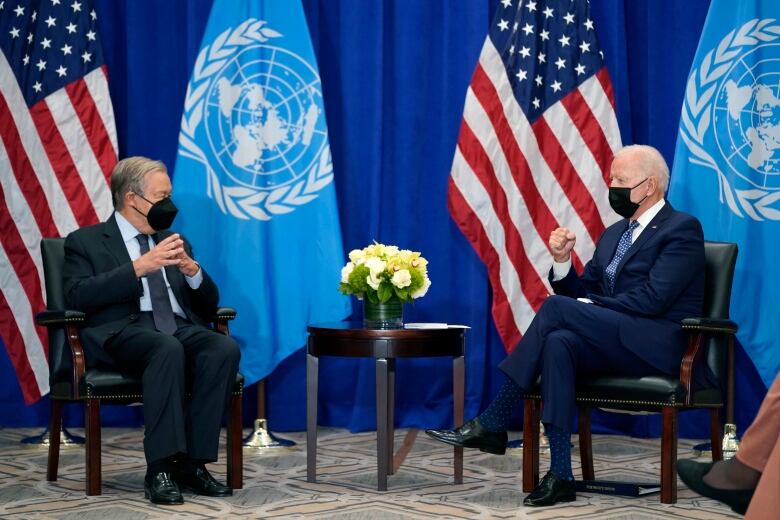Biden tells UN that U.S. is ready for 'relentless diplomacy'
Says country is past the era of endless wars, but is prepared to 'stand up for allies'
U.S. President Joe Biden used his first address before the United Nations General Assembly on Tuesday to declare that the world standsat an "inflection point in history" and must move quickly and co-operatively to address the festering issues of the COVID-19 pandemic, climate change and human rights abuse.
Without mentioning China directly, Biden acknowledged increasing concerns about rising tensions between the two economic and military powers. But he said, "We are not seeking a new Cold War or a world divided into rigid blocks."
He noted his decision to endAmerica's longest war last month, in Afghanistan, and set the table for his administration to shift U.S. attention to intensive diplomacy with no shortage of crises facing the globe. Hesaid he is driven by a belief that "to deliver for our own people, we must also engage deeply with the rest of the world."
"We've ended 20 years of conflict in Afghanistan," Biden said. "And as we close this period of relentless war, we're opening a new era of relentless diplomacy, of using the power of our development aid to invest in new ways of lifting people up around the world."
Biden, who arrived in New York on Monday evening to meet with UN Secretary-General Antnio Guterres ahead of Tuesday's address, offered a full-throated endorsement of the body's relevance and ambition at a difficult moment in history, a glaring difference with the speech given two years ago by then-president Donald Trump.
WATCH |Biden rejects isolationist approach:
Seeking to draw contrasts with his predecessor, Biden spoke about revitalizing alliances around the world, stressing U.S. support for NATO's mission in Europe as well as reaffirming its desire to work closely with the European Union and the countries in its Quad group:Australia, India and Japan.
"We will stand up for our allies and our friends," he said.
Biden also highlighted the American re-engagement with the Paris Accords, withthe threat of climate change a recurring theme of his speech.
More vaccine doses
He pledged to double U.S. financial aid to poorer countries to help them switch to cleaner energy and cope with the "merciless" effects of climate change. That would mean increasing assistance to about $11.4 billion US a year, Biden having just announced five months ago a doubling of the amount to $5.7 billion a year.
Biden also emphasized the U.S. contributions to the global vaccine-sharing effort, COVAX,a day ahead of hosting leaders on Wednesday at a virtual COVID-19 summit.

The United States plans to donate an additional 500 million Pfizer-BioNTech vaccines to nations around the world, lifting the total the country is sharing to more than one billion doses, according to a source familiar with the plans. The U.S. has already purchased 500 million doses of that vaccine and donated them through COVAX.
Chinese leader Xi Jinping reiterated on Tuesday in hisspeechto the General Assembly that China aims to provide two billion COVID-19 vaccine doses to the world by the end of the year.
Out of sync with allies
Eight months into his presidency, Biden has been out of sync with allies on the chaotic ending to the U.S. war in Afghanistan. He has faced differences over how to go about sharing coronavirus vaccines with the developing world and over pandemic travel restrictions. And there are questions about the best way to respond to military and economic moves by China.
Biden also finds himself in the midst of a fresh diplomatic spat with France, the United States's oldest ally, after announcing plans along with Britain to equip Australia with nuclear-powered submarines.
The move is expected to give Australia improved capabilities to patrol the Pacific amid growing concern about the Chinese military's increasingly aggressive tactics, but it upended a French defence contract worth at least $66 billionto sell diesel-powered submarines to Australia.
French Foreign Minister Jean-Yves Le Drian said Monday there was a "crisis of trust" with the U.S. as a result of the episode.
The Secretary-General's full speech to the #UNGA https://t.co/W9DyBQVVUd
—@UN_SpokespersonThe UN chief began the session by warning global leaders that the world has never been more threatened and divided and "we face the greatest cascade of crises in our lifetime."
"I'm here to sound the alarm. The world must wake up," Guterres said in his first words after convening the meeting.
'Billionaires joyriding to space'
Guterres said people may lose faith not only in their governments and institutions but in basic values when they see their human rights curtailed, corruption, the reality of their harsh lives, no future for their children and "when they see billionaires joyriding to space while millions go hungry on Earth."
Other pressing issues on the agenda of world leaders include rising U.S.-China tensions, Afghanistan's unsettled future under its new Taliban rulers, and ongoing conflicts in Yemen, Syria and Ethiopia's embattled Tigray region.
Others speaking Tuesday include Chinese President Xi Jinping, who in a surprise move will deliver a video address; and Iran's recently elected hardline President Ebrahim Raisi.
Biden expressed America's commitment to keeping nuclear weapons out of Iran's hands, and he likely rankled Xi by mentioning alleged human rights abuses in Xinjiang in his speech.
With files from Reuters and CBC News














_(720p).jpg)


 OFFICIAL HD MUSIC VIDEO.jpg)
.jpg)



























































































